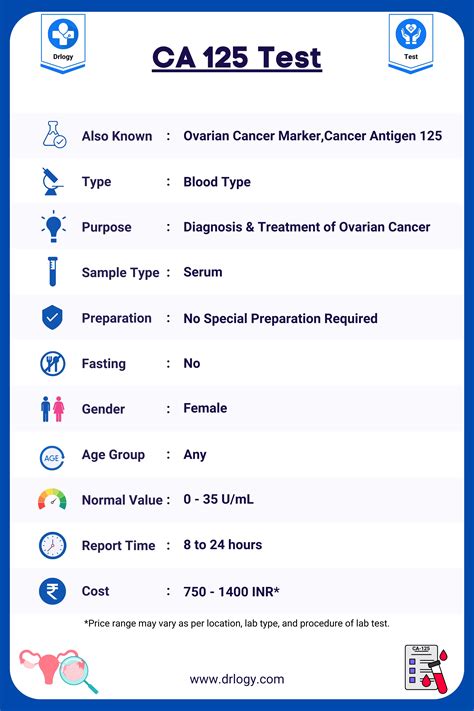Intro
Understand CA125 blood test results, a key ovarian cancer biomarker, and learn about normal ranges, elevated levels, and implications for womens health, including menopause and pelvic mass symptoms.
The CA125 blood test is a widely used diagnostic tool for detecting and monitoring ovarian cancer. However, its results can be complex and often require interpretation by a medical professional. Understanding the CA125 blood test results is essential for individuals who have undergone the test, as it can help them make informed decisions about their health. In this article, we will delve into the world of CA125 blood test results, exploring what they mean, how they are interpreted, and what steps to take after receiving the results.
The CA125 blood test measures the level of a protein called CA125 in the blood. This protein is produced by ovarian cancer cells and can also be found in healthy individuals, albeit at lower levels. Elevated CA125 levels can indicate the presence of ovarian cancer, but they can also be caused by other factors, such as endometriosis, uterine fibroids, or pelvic inflammatory disease. Therefore, it is crucial to understand the nuances of CA125 blood test results to avoid misinterpretation.
As we navigate the complexities of CA125 blood test results, it is essential to recognize the importance of accurate interpretation. A medical professional will consider various factors, including the individual's medical history, symptoms, and other test results, to determine the significance of the CA125 level. This comprehensive approach ensures that the results are interpreted in the context of the individual's overall health, rather than in isolation.
Understanding CA125 Blood Test Results

To grasp the meaning of CA125 blood test results, it is vital to understand the different levels of CA125 and their corresponding implications. The results are typically reported in units per milliliter (U/mL), and the normal range varies depending on the laboratory. Generally, a CA125 level below 35 U/mL is considered normal, while a level above 35 U/mL may indicate the presence of ovarian cancer or other conditions. However, it is essential to note that some individuals with ovarian cancer may have normal CA125 levels, while others with non-cancerous conditions may have elevated levels.
Interpreting CA125 Blood Test Results
The interpretation of CA125 blood test results requires careful consideration of various factors, including the individual's age, medical history, and symptoms. A medical professional will evaluate the results in conjunction with other diagnostic tools, such as imaging tests and biopsies, to determine the likelihood of ovarian cancer or other conditions. It is essential to recognize that CA125 blood test results are not definitive and should be used in conjunction with other diagnostic tools to ensure accurate diagnosis and treatment.CA125 Blood Test Results and Ovarian Cancer

The CA125 blood test is often used to monitor individuals with ovarian cancer, as it can help track the effectiveness of treatment and detect potential recurrence. Elevated CA125 levels can indicate the presence of ovarian cancer, but they can also be caused by other factors, such as inflammation or infection. Therefore, it is crucial to interpret CA125 blood test results in the context of other diagnostic tools and medical history.
Stages of Ovarian Cancer and CA125 Levels
The stage of ovarian cancer can influence CA125 levels, with more advanced stages often associated with higher levels. However, it is essential to recognize that CA125 levels can fluctuate during treatment and may not always reflect the current stage of the disease. A medical professional will consider various factors, including the individual's symptoms, medical history, and other test results, to determine the stage of ovarian cancer and develop an effective treatment plan.CA125 Blood Test Results and Non-Cancerous Conditions

Elevated CA125 levels can be caused by various non-cancerous conditions, such as endometriosis, uterine fibroids, or pelvic inflammatory disease. In these cases, the CA125 level may be elevated due to inflammation or other factors, rather than the presence of cancer. A medical professional will evaluate the results in conjunction with other diagnostic tools to determine the underlying cause of the elevated CA125 level and develop an effective treatment plan.
Common Non-Cancerous Conditions and CA125 Levels
Some common non-cancerous conditions that can cause elevated CA125 levels include: * Endometriosis: a condition in which tissue similar to the lining of the uterus grows outside the uterus, leading to inflammation and elevated CA125 levels. * Uterine fibroids: non-cancerous growths in the uterus that can cause inflammation and elevated CA125 levels. * Pelvic inflammatory disease: an infection of the female reproductive organs that can cause inflammation and elevated CA125 levels. * Pregnancy: CA125 levels can be elevated during pregnancy due to the production of CA125 by the placenta.What to Do After Receiving CA125 Blood Test Results

After receiving CA125 blood test results, it is essential to discuss the implications with a medical professional. They will interpret the results in the context of the individual's medical history, symptoms, and other test results to determine the next steps. Depending on the results, additional testing or treatment may be necessary to determine the underlying cause of the elevated CA125 level.
Follow-Up Testing and Treatment
Follow-up testing and treatment will depend on the individual's specific situation and the results of the CA125 blood test. A medical professional may recommend additional testing, such as imaging tests or biopsies, to determine the underlying cause of the elevated CA125 level. Treatment will depend on the diagnosis and may include surgery, chemotherapy, or other interventions.Conclusion and Next Steps

In conclusion, CA125 blood test results can be complex and require careful interpretation by a medical professional. Understanding the results and their implications is essential for individuals who have undergone the test, as it can help them make informed decisions about their health. By recognizing the importance of accurate interpretation and the potential causes of elevated CA125 levels, individuals can take the next steps towards diagnosis and treatment.
We invite you to share your thoughts and questions about CA125 blood test results in the comments below. If you have undergone the CA125 blood test, we encourage you to share your experience and any insights you may have gained. Additionally, if you have any questions or concerns about CA125 blood test results, please do not hesitate to ask, and we will do our best to provide you with accurate and helpful information.
What is the normal range for CA125 blood test results?
+The normal range for CA125 blood test results varies depending on the laboratory, but generally, a level below 35 U/mL is considered normal.
Can CA125 blood test results be used to diagnose ovarian cancer?
+CA125 blood test results can be used to monitor individuals with ovarian cancer, but they are not definitive and should be used in conjunction with other diagnostic tools to ensure accurate diagnosis and treatment.
What are some common non-cancerous conditions that can cause elevated CA125 levels?
+Common non-cancerous conditions that can cause elevated CA125 levels include endometriosis, uterine fibroids, pelvic inflammatory disease, and pregnancy.
